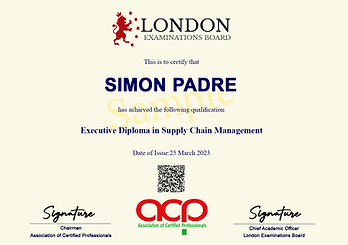PROGRAMME AIMS
This Executive Diploma in Supply Chain Management is designed to gain the knowledge and ability to apply various management techniques and tools used to manage local and international supply chain and understand the complexities relating to planning, implementing and controlling these complex operations. It is designed to equip those who are keen to take up employment in Management within the business sector. Those who are keen to further their education can progress on to either the Higher Diploma in Business Management or gain entry and acceptance into Year 2 of a Bachelor degree.
PROGRAMME STRUCTURE
The Executive Diploma in Supply Chain Management comprises of three modules.The Executive Diploma in Supply Chain Management is a professional diploma delivered in a manner that gives you the flexibility to learn at a time and place that suits your personal and work life. You can embark immediately on an Executive Diploma in Supply Chain Management knowing you can fit it into your schedule.
3 core modules 60 credits
- Introduction to Supply Chain Management – 20 Credits
- Logistics and Supply Chain Management – 20 Credits
- Global Supply Chain Management – 20 Credits
DELIVERY MODE
Mode A: Blended Learning mode
Available at selected Approved Learning Centres where classes are held plus learners are given a complete set of learning materials to facilitate independent study which can be accessed through our designated Learning Portal.
For each module we recommend that Approved Learning Centres provide between 6 and 12 hours of lectures/tutorials and that you spend at least 12 hours learning online.
Mode B: Fully Online mode
Learners are given a complete set of learning materials to facilitate independent study which can be accessed through our designated Learning Portal. For each module, we recommend at least 24 hours of online learning.
ADMISSION CRITERIA
An applicant may be admitted on the basis of evidence to suggest that he or she will be able to fulfill and benefit from the objectives of the programme and achieve the standard required for the award.
Summary of Entry Requirements
No prior knowledge is required. Applicants should normally be at least 16 years old and preferably with the following:
- Level 3 (QCF/RQF) Certificate;
- 4 GCSEs at grade C or above; or
- Working adults.
Advanced Standing / Exemptions / Credits Transfer (APL)
Consideration for the above for learners admitted onto the programme may be considered either at the beginning of a programme, or beyond the beginning of a programme, through an assessment of that learner’s prior learning, whether certificated or un-certificated. The process for making such a decision is known as the Accreditation of Prior Learning (APL) is a matter of academic judgment exercised by the appointed panel considering applications and approvals of APL. Where cohorts of learners are to be admitted with advanced standing on a regular basis, the arrangement should be subject to an Academic Progression Agreement.
ASSESSMENT STRUCTURE
Comprehensive Multiple Choice Questions (“MCQs”)
The mode of assessment is a carefully designed MCQs consisting of 50 MCQs to be taken either online or in a proctored paper-based final examination at approved centres. The duration of this final assessment will be 1.5 hours. The MCQ will serve to validate the attainment of broad understanding and application of knowledge by learners is related to the intended learning outcomes.
UNIT SPECIFICATION
Participants will be awarded an Executive Diploma in Supply Chain Management upon completion of the 3 Modules in Introduction to Supply Chain Management, Logistics and Supply Chain Management, and Global Supply Chain Management.
1. Introductory Supply Chain Management
Learning Outcomes
On completion of this Module learners will be able to:
- Articulate the various key concepts and principles relating to Supply Chain Management.
- Apply various techniques and tools used to manage supply chain
Topics covered include:
- Introduction to Supply Chain Management.
- The Role of Information Systems and Technology in Supply Chain Management.
- Managing the Flow of Materials across the Supply Chain
- Developing and Maintaining Supply Chain Relationships.
- Cases in Supply Chain Management.
- Future Challenges and developments in Supply Chain Management
2. Logistics and Supply Chain Management
Learning Outcomes
On completion of this Module learners will be able to:
- Examine the various key concepts and principles relating to Supply Chain Management.
- Apply various techniques and tools to undertake effective supply chain management.
Topics covered include:
- Introduction to Supply Chain Management
- Operations and Supply Chain Strategies
- Supply Management
- Logistics
- Forecasting
- Sales and Operations Planning (Aggregate Planning)
- Managing Inventory throughout the Supply Chain
- Managing Production across the Supply Chain
- Supply Chain Information Systems
- JIT/Lean Production
3. Global Supply Chain Management
Learning Outcomes
On completion of this Module learners will be able to:
- Articulate key knowledge relating to the concepts, tools, principles and practices relating to Purchasing Supply.
- Use the required models, tools, and techniques to ensure the effective application of purchasing supply practices in an organisation.
Topics covered include:
- Global Connectivity and Socioeconomic Leveling impact on Supply Chain
- Global Environmental Pressures on Supply Chains
- Global Demand and Supply Uncertainty
- How Supply Chain Plans Improve Performance
- The Global Supply Chain Planning Function
- Macro trend Demand/Supply Impacts: Supply Chain Planning Considerations
- The Seven Forces Driving Resource Scarcity
- Global Sourcing and Procurement Responses to Resource Scarcity
- Resource Scarcity Mitigation Strategies for the Supply Chain
- Mitigating Supply-Driven Imbalances

